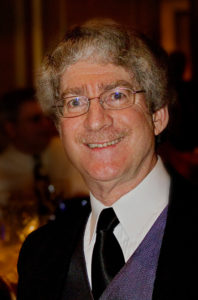BCIM Diplomate Roger K. Schwartzberg, DO, FAAIM, Explains What It’s Like to Specialize in Internal Medicine
 I knew I wanted to be an internist while I was still a medical student in the early 1970s. I realized then that this would allow me to strive to be an “expert” in the diagnosis and treatment of chronic diseases of adults. I would be given the opportunity to develop meaningful doctor-patient relationships as well as important interactions with other specialists and healthcare workers. Also, I would later be able to decide whether I wanted to be office-based or hospital-based, practice as a general internist, or even sub-specialize in the many fields within internal medicine.
I knew I wanted to be an internist while I was still a medical student in the early 1970s. I realized then that this would allow me to strive to be an “expert” in the diagnosis and treatment of chronic diseases of adults. I would be given the opportunity to develop meaningful doctor-patient relationships as well as important interactions with other specialists and healthcare workers. Also, I would later be able to decide whether I wanted to be office-based or hospital-based, practice as a general internist, or even sub-specialize in the many fields within internal medicine.
I retired in 2017, and, in retrospect, internal medicine was a great fit for me. The intellectual challenge of solving complex problems was very appealing. Plus, I am a “people person” and thoroughly enjoyed the opportunity to directly interact with patients to improve their health and well-being. I found immense satisfaction in helping patients deal with chronic medical problems as well as resolving acute medical issues.
The main challenge of working as an internist is realizing that your patients feel you are the primary physician in their medical care. Patients have great respect for the internist’s abilities, and you have a responsibility to avoid disappointing them.
I have always enjoyed teaching medical students, interns, and residents. One of my most memorable experiences as an internist was when I was voted “Educator of the Year” by the entire house staff. It was very gratifying and rewarding to receive such an honor.
I strongly recommend that internists in training read and re-read the basic textbooks rather than spend significant time reading the most current research articles in the journals. Understanding the basics of internal medicine will give you the foundation for learning more in the future.
Every physician in training should also develop listening skills. In fact, it’s among the most important skills not being tested on board exams. Actively listening to your patients when they describe their symptoms—paying attention to what they say and how they say it—will greatly increase the likelihood of making a correct diagnosis. Have empathy, make eye contact, and learn how to communicate appropriately so that your patients will be more likely to understand and adhere to your advice and instructions.
If you’re a physician considering validating your expertise through board certification, contact the Board of Certification in Internal Medicine (BCIM) for details about its eligibility requirements. The BCIM is a Member Board of the American Board of Physician Specialties® (ABPS).










